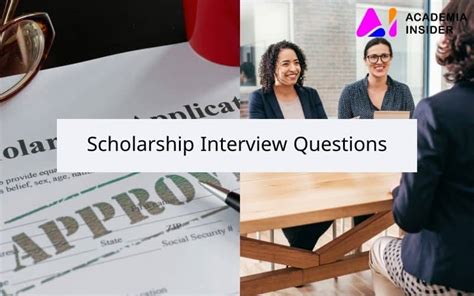In the competitive landscape of scholarship applications, acing your interview is crucial. Here are the most common questions you can expect, along with expert insights and strategies to make a lasting impression.

1. Tell Me About Yourself
- Objective: Gives the committee an overview of your background, aspirations, and why you’re a suitable candidate.
-
Tips:
- Highlight key experiences, skills, and achievements that align with the scholarship criteria.
- Quantify your accomplishments with specific numbers and examples.
- Be concise and focus on why your qualities make you an exceptional choice.
2. What Are Your Academic Goals and How Will This Scholarship Help You Achieve Them?
- Objective: Demonstrates your academic aspirations and how the scholarship supports your goals.
-
Tips:
- Articulate your specific educational plans, including your degree program and career aspirations.
- Explain how the scholarship will alleviate financial burdens or provide resources to enhance your academic journey.
- Show enthusiasm for your chosen field and how it aligns with your long-term goals.
3. Why Are You Deserving of This Scholarship?
- Objective: Highlights your unique qualifications, contributions, and why you stand out from other applicants.
-
Tips:
- Emphasize your academic achievements, extracurricular activities, volunteer work, or personal circumstances that make you a deserving recipient.
- Provide specific examples that demonstrate your resilience, determination, and commitment to excellence.
- Show the committee your passion for the scholarship’s mission and how it aligns with your values.
4. How Would You Use This Scholarship to Make a Difference in Your Community or Beyond?
- Objective: Assesses your social consciousness and how you plan to use the scholarship to positively impact others.
-
Tips:
- Share your ideas for using the scholarship to support a cause you’re passionate about.
- Explain how your plans align with the scholarship’s goals and the broader needs of society.
- Demonstrate your commitment to ethical decision-making and responsible use of resources.
5. What Are Your Strengths and Weaknesses?
- Objective: Helps the committee understand your self-awareness and ability to reflect on your abilities and areas for growth.
-
Tips:
- Focus on strengths that are relevant to the scholarship and your academic goals.
- Acknowledge any weaknesses or areas for improvement, but emphasize how you’re actively working to address them.
- Show that you’re not afraid to seek help or support when needed.
6. Why Should We Choose You Over Other Candidates?
- Objective: Asks you to differentiate yourself from the competition and highlight your unique qualities.
-
Tips:
- Reiterate your key qualifications and accomplishments.
- Discuss how your experiences and perspectives contribute to the scholarship’s overall mission.
- Express your confidence and belief in your ability to not only meet, but exceed expectations.
7. What Questions Do You Have for Us?
- Objective: Gives you an opportunity to engage with the committee and show your interest in the scholarship.
-
Tips:
- Ask insightful questions about the scholarship’s history, goals, and selection process.
- Seek clarification on any aspects of the scholarship that you’re curious about.
- Show that you’re actively engaged and genuinely interested in the scholarship.
Common Mistakes to Avoid
- Being unprepared: Research the scholarship, the committee, and potential questions in advance.
- Answering vaguely or superficially: Provide specific examples and details to support your responses.
- Being overly rehearsed or robotic: Be authentic and natural in your answers.
- Neglecting body language: Maintain eye contact, sit up straight, and dress appropriately.
- Assuming the committee knows your background: Summarize your resume or application briefly.
Useful Tables
Table 1: Sample Scholarship Questions by Category
| Category | Questions |
|---|---|
| About Yourself | Tell us about your academic background, interests, and goals. |
| Academic Goals | How will this scholarship support your academic endeavors? |
| Qualifications | Why are you deserving of this scholarship? |
| Impact | How would you use this scholarship to make a difference? |
| Strengths and Weaknesses | Describe your strengths and areas for growth. |
| Competition | Why should we choose you over other candidates? |
| Questions | What questions do you have for us? |
Table 2: Key Points to Consider When Preparing Responses
| Question | Key Points |
|---|---|
| Tell Me About Yourself | Highlight achievements, skills, and why you’re suitable. |
| Academic Goals | Articulate specific plans and how the scholarship helps. |
| Qualifications | Emphasize unique experiences, contributions, and values. |
| Impact | Share plans for using the scholarship to support a cause or make a positive impact. |
| Strengths and Weaknesses | Focus on relevant strengths, acknowledge weaknesses, and show progress. |
| Competition | Differentiate yourself, reiterate qualifications, and express confidence. |
| Questions | Ask thoughtful questions to engage the committee. |
Table 3: Common Interview Mistakes and How to Avoid Them
| Mistake | Prevention |
|---|---|
| Unpreparedness | Research the scholarship and potential questions. |
| Vague answers | Provide specific examples and details. |
| Rehearsed delivery | Be natural and authentic in your responses. |
| Poor body language | Maintain eye contact, sit up straight, and dress appropriately. |
| Assuming the committee knows you | Summarize your background briefly. |
Table 4: Questions to Ask the Scholarship Committee
| Question | Purpose |
|---|---|
| History of the scholarship | Learn about the scholarship’s mission and goals. |
| Selection process | Understand how candidates are evaluated and selected. |
| Past recipients | Gain insights into the qualities and accomplishments of past recipients. |
| Long-term impact | Ask about the impact the scholarship has had on past recipients and the community. |
| Future plans | Inquire about any future plans or initiatives related to the scholarship. |
